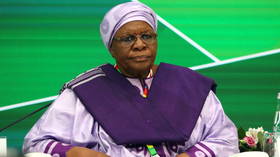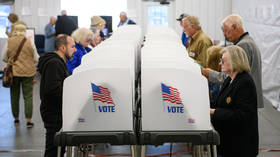Namibia elects first female president

Netumbo Nandi-Ndaitwah, the Namibian ruling party's candidate in last week’s disputed presidential election, has been declared the winner and becomes the Southern African nation’s first female president, according to official results.
The 72-year-old member of the South West Africa People’s Organisation (SWAPO) party received over 57% of the votes cast, the Electoral Commission of Namibia announced Tuesday evening. Her main rival, Panduleni Itula of the Independent Patriots for Change (IPC) party, attracted 25.50% of the vote.
“The Namibian nation has voted for peace and stability,” Reuters quoted the president-elect as saying following the declaration of the results.
On assuming office, Nandi-Ndaitwah will join Tanzania’s Samia Suluhu Hassan as the only current female leaders in Africa.
Her victory extends SWAPO’s 34-year rule in the large but sparsely populated country (population 2.6 million). The party has remained in power since Namibia gained independence in 1990 and despite ongoing dissatisfaction over unemployment, poverty, and corruption.
Support for SWAPO had fallen from 87% in the 2014 presidential election to 56% in 2019, with speculation that it might lose its grip on power in this year’s elections. In neighboring South Africa, the African National Congress (ANC), in power since the end of the racist apartheid system there, lost its majority in a historic election in June. Similarly, the Botswana Democratic Party lost power to the opposition Umbrella for Democratic Change in October, ending nearly six decades of its rule in the country.
Former Namibian President Hage Geingob appointed Nandi-Ndaitwah (often referred-to as ‘NNN’) as a candidate for SWAPO in March 2023. She became the vice president to Nangolo Mbumba, who took over the presidency after Geingob died in February. The politician had served as the minister of environment and tourism between March 2010 and December 2012. In the mid-1970s, she completed a course at the Lenin Higher Komsomol School in the Soviet Union.
Nandi-Ndaitwah has recognized unemployment as her country’s “biggest challenge” and has promised to prioritize job creation, particularly for young people. She has attributed worsening economic conditions to droughts and the Covid-19 pandemic.
Namibians also elected members of the National Assembly during the November 27 general elections, which were marred by technical difficulties and, in some areas, required a three-day extension of voting. SWAPO won a majority in the assembly, with 51 of the 96 elected seats.
Panduleni Itula’s IPC party, the main opposition group, won 20 seats, but the leader has threatened to challenge the results in court, citing “glaring and undeniable” electoral irregularities.
“We shall not, under any circumstances, recognize the outcome of the 2024 election... that is still, in our opinion, illegitimately continuing,” the 67-year-old former dentist and lawyer told reporters on Saturday.
In protest over the results, several other opposition parties boycotted the election authority’s announcement ceremony in the capital, Windhoek, newspaper The Namibian reported on Wednesday.













